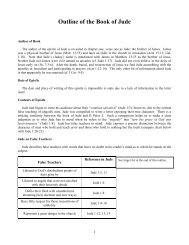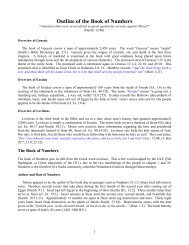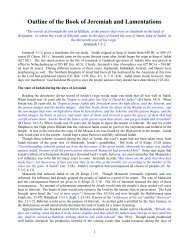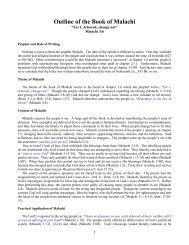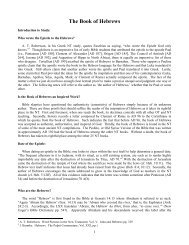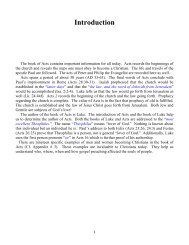Outline of the Book of I Timothy - The Floral Heights Church of Christ
Outline of the Book of I Timothy - The Floral Heights Church of Christ
Outline of the Book of I Timothy - The Floral Heights Church of Christ
You also want an ePaper? Increase the reach of your titles
YUMPU automatically turns print PDFs into web optimized ePapers that Google loves.
accepting false teaching, fables, and endless genealogies. Such a mindset and approach to<br />
spirituality will ra<strong>the</strong>r promote a reverence for sound doctrine (I Tim. 1:10).<br />
2. Paul continues, with <strong>the</strong> context <strong>of</strong> a correct mindset and approach to spirituality in <strong>the</strong><br />
foreground, to discuss <strong>the</strong> woman in <strong>the</strong> church. <strong>The</strong> woman is to "learn in quietness and<br />
subjection." <strong>The</strong> idea <strong>of</strong> "subjection" is “To place or arrange under, to post under, to subject, to<br />
be obedient” (LS 848)... “To place or arrange under; to subordinate” (Moulton 419). <strong>The</strong> woman<br />
is identified as a student or pupil to <strong>the</strong> man. God has ordained that she take a subordinate role <strong>of</strong><br />
obedience to <strong>the</strong> man in <strong>the</strong> assembly.<br />
3. fur<strong>the</strong>rmore she is commanded "not to teach or have dominion over a man." <strong>The</strong> KJV uses <strong>the</strong><br />
term, "usurp authority over <strong>the</strong> man" and <strong>the</strong> NKJ and NASV use <strong>the</strong> phrase, "exercise authority<br />
over a man." Teaching a man <strong>the</strong> sound doctrine <strong>of</strong> <strong>Christ</strong> in a public setting would be to "have<br />
dominion over" that man. <strong>The</strong> word "dominion" (au<strong>the</strong>ntein) = "One acting by his own authority<br />
or power, one who executes with his own hand; to have authority over, domineer” (Moulton 59)...<br />
“To have full power over” (LS 132). “Autodikeo was <strong>the</strong> literary word for playing <strong>the</strong> master<br />
while au<strong>the</strong>nteo was <strong>the</strong> vernacular term. It comes from aut-hentes, a self-doer, a master,<br />
autocrat. It occurs in <strong>the</strong> papyri (to domineer, authoritative) (Robertson; Vol. 4 pg. 570). “Have<br />
authority, domineer over someone; master” (AG 121). “<strong>The</strong> public teacher <strong>of</strong> God’s people does<br />
not only tell o<strong>the</strong>rs what <strong>the</strong>y need to know, but in <strong>the</strong> capacity <strong>of</strong> such a teacher he stands before<br />
his audience to rule and govern it with <strong>the</strong> Word. That position and that au<strong>the</strong>ntein <strong>the</strong> Word<br />
itself accords to <strong>the</strong> man and withholds from <strong>the</strong> woman, and no woman may step into <strong>the</strong> place<br />
<strong>of</strong> <strong>the</strong> man without violating <strong>the</strong> very Word she would try to teach to both women and men. Her<br />
effort to do so would be self-contradictory in God’s eyes despite what <strong>the</strong> world may say.” 3 “<strong>The</strong><br />
Greek word au<strong>the</strong>ntein signifies both to have and to exercise authority over ano<strong>the</strong>r. In this<br />
passage it is properly translated, usurp authority: Because when a woman pretends to exercise<br />
authority over a man, she arrogates a power which does not belong to her” (MacKnight Vol. III –<br />
IV; pg. 203). “Let a woman not enter a sphere <strong>of</strong> activity for which by dint <strong>of</strong> her very creation<br />
she is not suited. Let not a bird try to dwell under water. Let not a fish try to live on land. Let<br />
not a woman yearn to exercise authority over a man by lecturing him in public worship. For <strong>the</strong><br />
sake both <strong>of</strong> herself and <strong>of</strong> <strong>the</strong> spiritual welfare <strong>of</strong> <strong>the</strong> church such unholy tampering with divine<br />
authority is forbidden.” 4 “<strong>The</strong> woman’s station in life demands modesty, humility, and <strong>the</strong>y<br />
should be free from <strong>the</strong> ostentation <strong>of</strong> appearing so much in public as to take part in <strong>the</strong> public<br />
services <strong>of</strong> teaching and praying. It does not become <strong>the</strong>ir rank in life; it is not fulfilling <strong>the</strong><br />
object, which God evidently intended <strong>the</strong>m to fill. He has appointed men to rule; to hold <strong>of</strong>fices;<br />
to instruct and govern <strong>the</strong> church; and it is improper that women should assume that <strong>of</strong>fice upon<br />
<strong>the</strong>mselves.” 5 Certainly <strong>the</strong> apostle Paul encouraged women to teach and preach, but not in <strong>the</strong><br />
assembly (Titus 2:3-5) (see study # 16; <strong>The</strong> Role <strong>of</strong> Women in <strong>the</strong> <strong>Church</strong>).<br />
4. Paul <strong>the</strong>n gives two reasons for said instructions:<br />
a. Adam was formed first <strong>the</strong>n Eve (<strong>the</strong> woman) (see I Cor. 11:9-10). First formed equates to<br />
some semblance <strong>of</strong> superiority over ano<strong>the</strong>r. Jesus was <strong>the</strong> first fruits <strong>of</strong> all resurrected to<br />
never die again and <strong>the</strong>reby stands as one in authority (see I Cor. 15:20)<br />
b. Secondly, "Adam was not beguiled, but <strong>the</strong> woman being beguiled hath fallen into<br />
transgression." <strong>The</strong> word "transgression" (parabasei) = "to step by <strong>the</strong> side <strong>of</strong>; to deviate...<br />
violation <strong>of</strong> <strong>the</strong> law" (Moulton 300). <strong>The</strong> woman was originally deceived by Satan not man<br />
(see Gen. 3:1ff).<br />
5. <strong>The</strong> subjected woman is "not to teach a man but to learn in quietness." Paul addressed this issue<br />
at I Corinthians 14. <strong>The</strong> ultraliberal church in Corinth had many problems and apparently one<br />
was women usurping authority over men in <strong>the</strong> assembly by publicly teaching <strong>the</strong>m. Said actions<br />
caused confusion and disorder in <strong>the</strong> assembly <strong>of</strong> <strong>the</strong> saints upon <strong>the</strong> first day <strong>of</strong> <strong>the</strong> week. Paul<br />
consequentially charges, "Let <strong>the</strong> women keep silence in <strong>the</strong> churches: for it is not permitted unto<br />
3 Ibid; (Lenski on <strong>the</strong> word au<strong>the</strong>ntein pg. 564).<br />
4 Hendriksen, W. New Testament Commentary over <strong>The</strong>ssalonians, <strong>Timothy</strong> and Titus pg. 109.<br />
5 Barnes, A. Barnes Notes on I Cor. 14:34 pg. 275<br />
15



